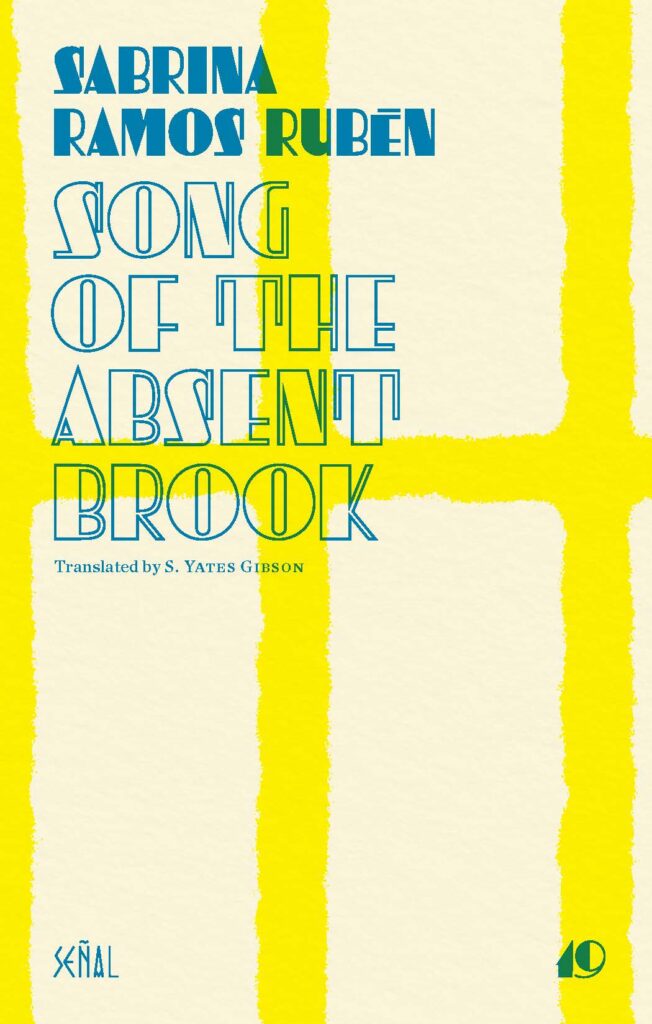Sabrina Ramos Rubén's poetics...[reach] out of a materiality that sings...
Raquel Salas Rivera

Song of the Absent Brook
Sabrina Ramos Rubén
Translated by S. Yates Gibson
December 2022
Sabrina Ramos Rubén’s first English publication, translated by S. Yates Gibson, explores wild landscapes and architectural ruins, personal anguish and individual wonder. These poems are minimalist and visceral, cutting to the heart of Ramos Rubén’s subjects through first-person narration sowed with eroticism, familial (dis)connection, and Caribbean flora and fauna. In a time of global climate change, Ramos Rubén’s is a voice from a colonized part of the world especially vulnerable to environmental disasters, and her poetry treads new ground between humanity, kinship, and nature.
Included in the Señal 2022 Bundle.
About the Author
Sabrina Ramos Rubén (Cayey, Puerto Rico, 1985) is a writer, visual arts curator, and translator. She studied her Art History bachelor’s degree at the University of Puerto Rico, Río Piedras Campus. In 2016, her first poetry collection, Mangle rojo (Red Mangrove) was published by La Secta de los Perros, and her second book of poems, Charco hondo (Deep Pool) was published by Alayubia in 2018. She holds a master’s degree from the Graduate Translation Program at the University of Puerto Rico, Rio Piedras Campus and is currently one of the translators for the Puerto Rican Literature Project. Her work has been published in the Claridad newspaper and in the National Autonomous University of Mexico’s Periódico de Poesía.
Praise
Glissant saw that the mangrove, not grass, was the most apt example of a rhizomatic formation, but he also saw a mangrove in the rhizome, the specificity of the Caribbean, a place from which to create a poetics, not just an example of a theory, but rather its source, rooted in air, water, land, and death-in-life. Sabrina Ramos Rubén's poetics similarly reaches out of a materiality that sings, a present absence that echoes the literary, the hallucinatory, the quotidian. It is a poetics of texture, of filins, una poetica enfarinada, como la arena/harina, the slush, crab dust y manglar. Gibson's translation will bring this seminal work to new readers, springing new mangroves, new centers for this life.
Raquel Salas Rivera
Praise for Previous Work
Again I celebrate this collection of poems, a promise of future mangroves, from a voice that has expanded itself to create coastline without failing to surprise us, a collection that invites us to transform our perception, as salt is transformed into oxygen among the roots of the the mangrove and 'safekeep in the shadow / the memories of beings that devour / the breaths of the living.'
Mara Pastor
About the Translator
Sarah Yates Gibson (West Palm Beach, Florida, 1992) is a queer feminist translator. She earned her bachelor’s degree in Spanish Language and Culture from New College in Sarasota, where she translated feminist satirical essays by Rosario Castellanos for her thesis. For her master’s degree in Translation from the University of Puerto Rico, Río Piedras, she translated a portion of Destellos de la negritud: investigaciones caribeñas (Glimmers of Blackness: Caribbean Research), an anthology of essays by anti-racist academic Marie Ramos Rosado. Her most recent project is the translation of Charco hondo (Deep Pool), a poetry collection by Puerto Rican author Sabrina Ramos-Rubén.
In the News
Links
Publication Details
ISBN: 978-1-946604-12-5
Chapbook
32 pp, 5.25 x 8.25 in
Publication Date: December 15 2022
Distribution: Asterism Books (US)
Series: Señal #19